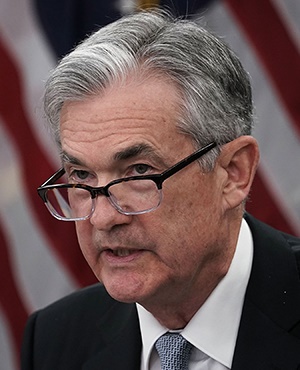
In 2009, the US Federal Reserve (Fed) in effect saved the world by embarking on a massive programme of monetary stimulus, called quantitative easing (QE), and so – through its extended money-printing and -buying programme – prevented a global depression from taking hold.
With the onset of the coronavirus pandemic in 2020, the Fed has embarked on precisely the same path, initiating an initial $700bn bond buyback, this time in conjunction with fiscal measures from the US Congress. More has been promised.
In total, about $3tr has been pumped into the US economy at a time when the GDP could fall 30%, in the same way it did during the Great Depression of the 1930s, and as its unemployment has already ballooned to nearly 15% from below 4% at the beginning of the year.
As a result, total US debt is set to balloon further. To mitigate the debt surge, the Fed is banking on a huge turnaround in economic growth. Fed chairman Jerome Powell predicts a strong recovery in the US economy already in the third quarter of this year.
There are, however, some factors that may make the growth road ahead much bumpier than in 2009. For one, in 2009 the global economy was fully committed to globalisation and open trade between all countries, through which growth could be boosted. Now globalisation is under threat, thanks to President Donald Trump’s protectionist policies. And recently China slapped tariffs of 80% on Australian exports.
It is unclear what the sources of a future surge in growth will be, especially while the dollar is expected to remain strong. The stronger dollar is linked to the disjointed US tax structure. Corporate tax in the US only totals about 9% of all federal taxes collected, compared with 17% in SA. Individual US taxes amount to 41% and payroll taxes to 40%.
That means little redress on the fiscal side is to be expected in the US.
Social unrest is another real threat in the US, as Trump’s tax reforms have done little to benefit the average American. Corporate America has been the great winner, with the corporate tax rate now at 21%, down from 35%.
But, effectively, corporate America pays extraordinarily little tax in the US, as the country has a residence-based tax system, meaning global profits from companies are only taxed when it is brought back into the US.
Wealth disparities have increased markedly, coinciding with the decimation of the middle class. In 1970, the share of income earned by the richest 1% was 8%. Today it is 40%. In the 1920s, before the Great Depression, the comparable figure was 20%.
The spread of multinational companies’ global reach resulted in trillions of dollars being kept in global tax havens such as Ireland, Bermuda and Switzerland, where tax rates are much lower. This “stateless income” is mostly owned by individuals and shareholders on Wall Street. The American federal state benefits little in the form of tax receipts.
Tax havens have the potential of inherently destabilising the world order. The Organisation for Economic Cooperation and Development (OECD) has recognised this by introducing the base erosion and profit shifting (Beps) action plan initiative whereby individual countries are set to benefit more by taxing multinational profits at the point where the value is created.
At present, little of the profits made internally benefits the host country, apart from some job creation. The aggressive linkage of local profits to intellectual property, as well as widespread internal tax deductions available to companies, results in the repatriation of profits to tax havens.
Any investment by a global multinational in any individual country is mostly tax-deductible. And with developments such as e-commerce and digital currencies offering new challenges, countries are struggling to widen the local tax base. American power in the world has faded over the past few decades. In 1945, after World War II, US GDP represented 52% of the world’s total. In 1970 it amounted to 25%. In 2015 it was 15% and is set to fall to 13% in 2024. China’s economic miracle represents 18% of world GDP in2015 and is set to rise further.
The US looks particularly vulnerable at present. Its huge total debt of $20tr or 103% of GDP is set to increase exponentially over the next few years, with little on the horizon to indicate this will change for the better.
But take note: When tensions with China rises, the dollar as the world’s reserve currency still strengthens. When conditions in the US economy improve, Wall Street benefits, as the 30% recovery in the DowJones Index in April illustrates.
And the US 10-year treasury remains the world’s greatest safe-haven investment. American entrepreneurship is still an important part of life, with Apple, Amazon, Google and Facebook potent trademarks worldwide.
So, the US will remain a force on the global stage. However, the present reality is that the US economy is built on debt. How the US reacts to this challenge will affect markets worldwide.
This article originally appeared in the 4 June edition of finweek. Buy and download the magazine here or subscribe to our newsletter here.




 Publications
Publications
 Partners
Partners











